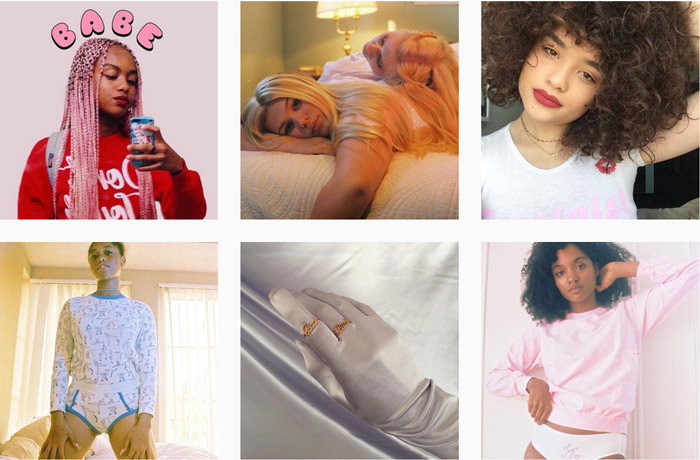Contemporary artists have long been at the forefront of social and aesthetic change. Art, fashion, music, film, dance, and intersections across all genres have become even more of a melting pot of influence through the ease of connection over social media. The new wave of socio-cultural activism that spans art, fashion, and music is greatly indebted to Instagram and Tumblr for its popularity and poignancy.
Social activism is imbued within the fashion of our generation: Androgynous and unisex styles, oversized clothing, and gender blending outfits. Clothing is a way of demonstrating changes in society’s understanding of gender identity, objectification, gaze, and body autonomy. A few small designers have taken to Instagram almost exclusively to promote, network, and sell their designs. This is a business model that reflects what today’s youth seem to care about more and more: socially conscious and relevant products.
Me and You is one brand that has seen success following this model. Headed by Maayan Toledo and Julia Baylis, Me and You is known for their simple white and pink underwear with “feminist” written proudly on the back. Other popular products are “feminist” and “bad bitch” nameplate necklaces and sweatshirts with “Don’t Touch” emblazoned across the front. The brand maintains a soft, feminine aesthetic (lots of baby pink and cursive script) while commenting on the way marketing and consumption is intertwined with the patriarchal male gaze.
A large part of this commentary comes from the brand’s many collaborations and association with other feminist and activist figures. The brand communicates intersectionality through their work with models such as Barbara Ferreira and Diana Veras. Both models have a large social media presence and use this platform to discuss the lack of representation of people from all walks of life, across the spectrum of body type, sexuality, and race.
Maayan Toledo and Julia Baylis are just two out of hundreds of artists, mostly based in New York City, whose work deals with these issues. Petra Collins and Grace Micelli (aka artbabygirl on Instagram) are widely known for their feminist-focused art and clothing production (in the case of the latter). Amandla Stenberg, Hari Nef, Jazz Jennings, Jaden Smith, and Sanam Sindhi are just a few other figures whose work is essentially involved in changing the cultural landscape through social media.
It’s not news to say that Instagram has become an indispensible tool for the liberal and politically-conscious movements sweeping across North America and the world. Feminism, Black Lives Matter, the Bernie Sanders campaign, and Queer and Trans People of Color’s rights have expanded in scope and visibility thanks to Instagram. These movements have become an accessory, a component in the millennial aesthetic. Political correctness and a socially conscious attitude are just as trendy as mom jeans and Adidas Superstar shoes. Self-expression in fashion has simply expanded to include an implicit declaration of personal politics, and that’s not a bad thing at all. In fact, it’s a welcome new change.
Grace Micelli (@artbabygirl)’s illustrations and clothing appropriates a juvenile style and pop culture iconography as a celebration of the everyday millennial: Someone unaligned with gender norms and unsatisfied with the drabness of today’s styles. Micelli’s kitschy and feminine aesthetic spices ubiquitous American Apparel-style basics, creating a norm core look that is anything but normal.
Artist Arvida Bystrom (@arvidabystrom) models the “feminist” underwear by Me and You. Self- love and radical feminism are common themes amongst Me and You’s collaborators, models, and photographers. iPhones, selfie sticks, and Macbooks covered with stickers are typical props in many photos, illustrating how this particular feminist aesthetic has manifested itself in the age of personal communication technologies.
@myfriendpaige and @juliettelabelle (via @ozpurple) pose with shirts from Bernie Barbie, an unofficial Bernie Sanders merchandiser. Bernie Barbie donates 40 per cent of their proceeds to Planned Parenthood. The stylized shirts characterize the Bernie ‘brand’ as pro-feminist and pro-sexuality while co-opting the trendiness of Bernie Sanders and democratic socialism.







